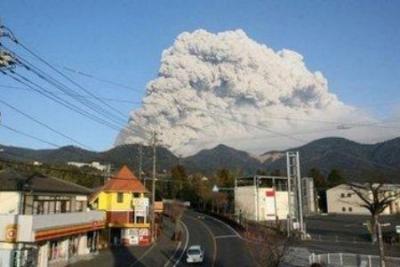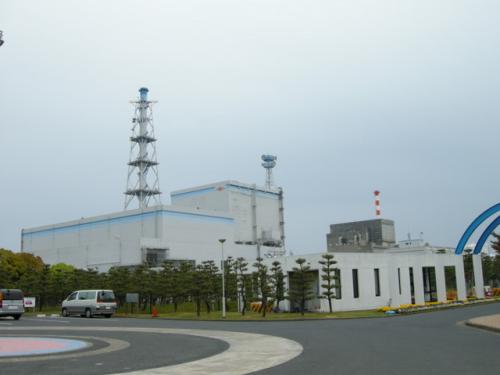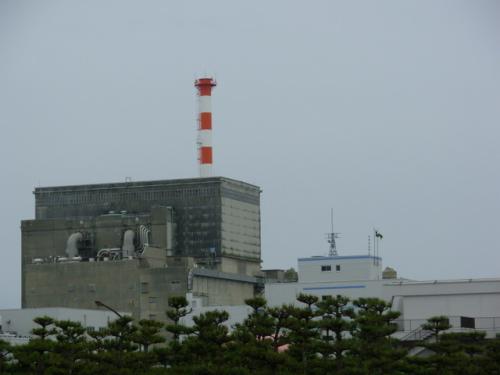Topic: NATURE - on March 13, 2011 at 10:54:00 PM CET
Vulkan Shinmoedake in Japan ausgebrochen
Nach Erdbeben, Tsunami und Atomunfällen jetzt auch noch das: Im Südwesten Japans hat heute der Vulkan Shinmoedake Asche und Gestein in die Atmosphäre geschleudert. Die Asche sei dabei bis in eine Höhe von 4000 Metern gelangt, teilten die Behörden mit.
... Link (0 comments) ... Comment
Topic: NATURE - on March 13, 2011 at 10:41:00 PM CET
Japan's Shinmoedake volcano spews ash and rock two days after quake
The Japanese weather agency has reported that a volcano in southern Japan began spewing ash and rock even as the country struggled to recover Sunday from the catastrophic earthquake and tsunami.
Japan's Meteorological Agency issued a warning Sunday that the Shinmoedake volcano resumed activity after lying dormant for a couple of weeks.

... Link (0 comments) ... Comment
Topic: War and Peace News - on March 13, 2011 at 5:30:00 PM CET
Kühlsystem in weiterem AKW in Japan ausgefallen - AKW Tokai [Tōkai ] - Nuklearer Notstand um AKW Onagawa
In einem weiteren Atomkraftwerk in Japan ist heute das Kühlsystem ausgefallen, wie die Nachrichtenagentur Kyodo unter Berufung auf die Feuerwehr berichtet. Es handelt sich um das AKW Tokai an der Ostküste südlich von Fukushima.
... Link (0 comments) ... Comment
Topic: nuclear power - on March 13, 2011 at 5:21:00 PM CET
Cooling system pump stops at Tokai No.2 plant
The Tōkai Nuclear Power Plant (東海発電所, Tōkai hatsudensho?, Tōkai NPP) was Japan's first nuclear power plant. It was built in the early 1960s to the British Magnox design, and generated power from 1966 until it was decommissioned in 1998. A second nuclear plant, built at the site in the 1970s, was the first in Japan to produce over 1000 MW of electricity, and still produces power as of 2009. The site is located in Tokai in the Naka District in Ibaraki Prefecture, Japan and is operated by the Japan Atomic Power Company.


... Link (0 comments) ... Comment
Topic: nuclear power - on March 13, 2011 at 4:27:00 PM CET
Video: Japan nuclear meltdown threat
... Link (0 comments) ... Comment
Topic: nuclear power - on March 13, 2011 at 4:15:00 PM CET
Japan declares state of emergency at second nuclear power facility after excessive radiation levels were detected at Onagawa plant.
XCESSIVE levels of radiation at a second Japanese nuclear facility after Friday's earthquake have led authorities to report a state of emergency there, the UN nuclear agency said.
'Japanese authorities have informed the IAEA that the first or lowest state of emergency at the Onagawa nuclear power plant has been reported by Tohoku Electric Power Company,' the International Atomic Energy Agency said Sunday.
straitstimes.com reuters.com jpost.com edition.cnn.com Onagawa_Nuclear_Power_Plant [wiki]
... Link (0 comments) ... Comment
Topic: NATURE - on March 13, 2011 at 2:30:00 PM CET
Confirmed deaths top 1,300
More than 1,300 people are confirmed dead from the devastating earthquake and tsunami which hit northeastern Japan on Friday..............
Miyagi Prefecture has confirmed 515 deaths in Higashi-matsushima, Kesen-numa and Sendai cities.
In the coastal town of Minami-Sanriku, most private homes and other structures have been washed away. About 10,000 people, or more than half the total population of 17,000, remain missing.
... Link (0 comments) ... Comment
Topic: nuclear power - on March 13, 2011 at 1:46:00 PM CET
Fukushima II Nuclear Power Plant
After the March 11, 2011 Sendai earthquake and tsunami, Nuclear Engineering International reported that all four units were automatically shut down.[1] Tokyo Electric on March 12 reported that the cooling system for three reactors (numbers 1, 2 and 4) at the plant had topped 100 °C between 05:30 and 06:10 JST, less than one hour after the start of additional cooling with condensate water,[5][6][7] and that the "pressure suppression function was lost".[6] According to a Reuters report, officials are "prepar[ing] for release of pressure" from the plant.[8] TEPCO has announced it was preparing for pressure release in the containments of all four units
... Link (0 comments) ... Comment
Topic: nuclear power - on March 13, 2011 at 12:41:00 PM CET
Überhitzung der Brennstäbe
In zwei Reaktoren des japanischen Atomkraftwerks Fukushima dürfte bereits eine zumindest teilweise Kernschmelze eingesetzt haben. Dabei überhitzen die Brennstäbe eines Atomreaktors so, dass sie sich verflüssigen und in eine unkontrollierbare, radioaktive Schmelze verwandeln.
Die Folgen sind schwer kalkulierbar: Ein Gemisch aus Spaltmaterial und Metall, das bis zu 2.000 Grad Celsius oder noch heißer wird, kann sich durch die Schutzhülle des Reaktorkerns fressen und in die Umwelt gelangen. Möglich sind auch heftige Explosionen. „Bei der Kernschmelze kommt es zu physikalischen Prozessen, die nicht mehr zu stoppen sind“, sagt Greenpeace-Atomexperte Tobias Münchmeyer.
... Link (0 comments) ... Comment
Topic: NATURE - on March 13, 2011 at 12:30:00 PM CET
Media Tools > Japan - picasa
Mar 12, 2011 photos: 26 – 46 MB Public on the web
... Link (0 comments) ... Comment
Topic: nuclear power - on March 13, 2011 at 12:21:00 PM CET
IPPNW fordert weltweite Abschaltung aller Atomkraftwerke
25 Jahre nach Tschernobyl und am Tag des Super-GAU in Fukushima fordert die Ärzteorganisation IPPNW die weltweite Abschaltung aller Atomkraftwerke. Die Risiken sind auch bei den angeblich sicheren Atomkraftwerken der westlichen Welt nicht beherrschbar. Die IPPNW weist darauf hin, dass die Bevölkerungsdichte in Japan rund 15fach höher ist als in der Tschernobyl-Region (Japan: 337 Einwohner/Quadratkilometer). Je nach Windrichtung und Wetterlage können die gesundheitlichen Auswirkungen in Japan dramatisch sein.
... Link (0 comments) ... Comment
Topic: nuclear power - on March 13, 2011 at 12:20:00 PM CET
Zynische und unmoralische Politik - Grünen-Chefin Roth im Interview
Die Grünen erwarten, dass das Atomunglück in Japan zum Thema der Landtagswahl in Baden-Württemberg wird. "Das wird den Wahlkampf politisieren", sagt Parteichefin Claudia Roth im Interview. Scharf kritisierte sie den Umgang der schwarz-gelben Bundesregierung mit der Katastrophe.
... Link (0 comments) ... Comment










